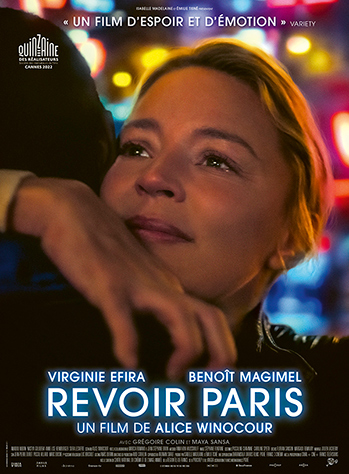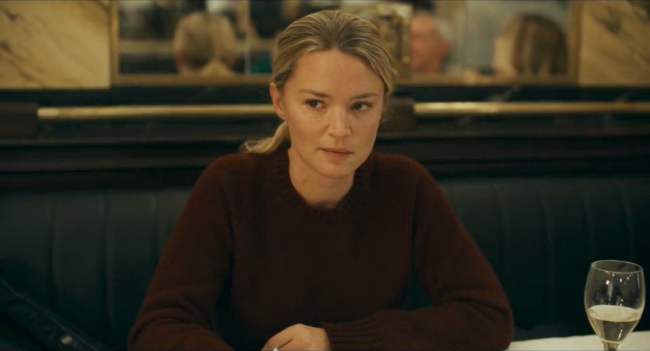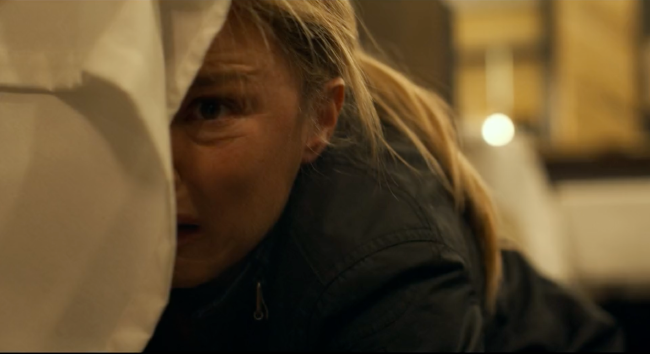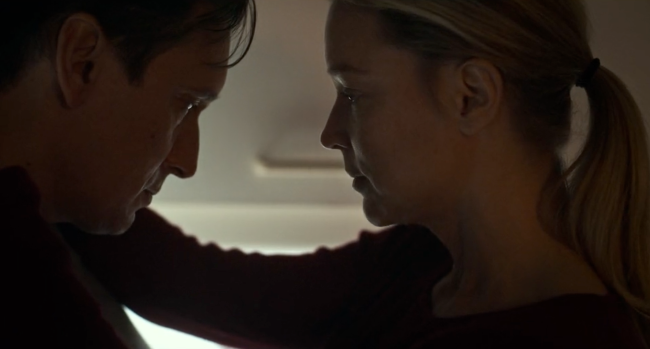Film Review: Revoir Paris
- SUBSCRIBE
- ALREADY SUBSCRIBED?
BECOME A BONJOUR PARIS MEMBER
Gain full access to our collection of over 5,000 articles and bring the City of Light into your life. Just 60 USD per year.
Find out why you should become a member here.
Sign in
Fill in your credentials below.
Revoir Paris: You Can’t Go Home Again … Or Can You?
In Revoir Paris, Alice Winocour aims to treat an important subject using the form of the traditional mainstream film, specifically the genre of sentimental pathos, also known as the tearjerker. It’s one of the first serious films dealing with the November 2015 terrorist attacks that struck the Bataclan concert hall and other venues. (Another coming out at roughly the same time is Novembre.) She doesn’t exploit convention for meretricious reasons but to limn truths accessible to the average moviegoer. She succeeds to a great extent, but not completely.
The movie deals with events retrospectively, an approach which distances us, and keeps the film from falling into mere exploitation. Mia (Virginie Efira) is a survivor —surviving victim — of an attack on a restaurant in the east of Paris. (Aside from the Stade de France, north of Paris, all the attacks happened in eastern districts populated by the young, workers, hipsters and minorities.) Wounded and traumatized, she’d withdrawn to her family’s home in the country, but now returns to Paris, and her past.

Revoir Paris © Pathé Films
Mia’s need to revisit events might seem perplexing. She has a good job as a Russian-French interpreter, plush apartment, nice partner, and can’t really remember the events. But this hole in her memory gnaws at her. Virginie Efira (who was in Paul Verhoeven’s Benedetta) does a first-rate job portraying Mia as a solid, intelligent woman who has difficulty not having a rational grip on an important episode in her life. That we almost always see her wearing a nifty leather jacket becomes, intentionally or no, a sign of her intrepid character.
Mia’s search takes on various permutations. At first it’s a clinical exercise, a kind of therapy. It’s fascinating to discover that other survivors meet at the attack site to talk in a sort of encounter group, that there are also the inevitable online forums. There may be real-life victims trying to recover from memory loss, but for us there’s something unsatisfying about it, presumptuous as that may be. It’s reminiscent of old movies that took a primitive Freudian view of characters’ emotional problems.

Revoir Paris © Pathé Films
The director herself seems wary of this approach, and takes on a different one after another survivor accuses Mia of a selfish action during the attack: locking herself in a bathroom and refusing to let in others. It seems to be an unfounded charge by an unhinged woman, but the search turns to exculpation: Mia the victim needs to prove that she’s innocent. But the director discards that as well. Finally, Mia decides to find the restaurant employee (Amadou Mbow) who’d helped her, see that he’s okay, and thank him. There’s something interesting in taking up and discarding various tacks — it reflects how a real person might behave, changing motivations and concerns.
Another subplot concerns the heroine’s relationships. As she focuses on the events of 2015, she distances herself from her partner, who comes to seem self-pitying and clueless. Grégoire Colin gives a good performance as Vincent, but the role is thankless, and feels contrived. It’s essentially a pretext for Mia getting involved with Thomas, another survivor, undergoing painful leg reconstruction. This works but barely — we can hear the gears of conventional storytelling clanking away. As Thomas, Benoît Magimel (La Pianiste) is charming, funny, simpatico — we like him, still he seems to have stepped out of a rom-com.

Revoir Paris © Pathé Films
The actors in the supporting parts may be even more affecting than the main players. A server at the restaurant, the African employee who helped Mia, an African woman who helps her find him, the woman who organizes the sessions at the restaurant, an adolescent daughter of two victims — they all create a lifelike, dense little world.
Ms. Winocour has a sure empathetic touch, but occasionally strains for more. There are several short sequences, vignettes, about the experiences of others, also a few voice-overs à la Terence Malick. These don’t add much, and are a backhanded vindication of the direct, concrete manner of most of the film.

Revoir Paris © Pathé Films
One of the best things about Revoir Paris is its consideration of those who’ve often been overlooked. The media tends to focus on privileged victims, overlooking the immigrants and workers who were also there. Ms. Winocour takes us into a banlieue housing project where Mia inquires about the man who helped her, and the scene jars (in a good way), while remaining low-key, not melodramatic as in urban thrillers.
When the director shows flashback images of violence, it’s quick and brutal, not gory. What shocks is how powerful weapons were able to snuff out lives in an instant. She’s also not interested in depicting the terrorists, neither demonizing nor psychoanalyzing them, nor getting into the politics. The senselessness of the violence overwhelms all that — the terrorists themselves were killed, self-sacrificed to the senselessness.
Revoir Paris is unsurprisingly uplifting in the end, and this tearjerker did jerk a few of my tears along the way. But what makes the film interesting is how the interpreter-protagonist manages to interpret the experiences and perceptions of those she encounters. What makes it essential viewing is showing how such interpretation goes hand in hand with dredging up our collective memory — rather than private individual ones.
Production: Dharamsala – Darius Films
Distributions: Pathé
For more Bonjour Paris film reviews, click here
Lead photo credit : Revoir Paris © Pathé Films
More in Alice Winocour, film review, french cinema, French film





